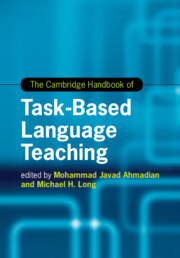Book contents
- The Cambridge Handbook of Task-Based Language Teaching
- Cambridge Handbooks In Language And Linguistics
- The Cambridge Handbook of Task-Based Language Teaching
- Copyright page
- Dedication
- Contents
- Figures
- Tables
- Contributors
- Preface The Origins and Growth of Task-Based Language Teaching
- Part I The Rationale for Task-Based Language Teaching
- Part II Tasks and Needs Analysis
- Part III The Task Syllabus and Materials
- Part IV Methodology and Pedagogy
- Part V Task-Based Language Teaching with School-Age Children
- Part VI The Teacher in Task-Based Language Teaching
- 12 Teacher Preparation and Support for Task-Based Language Teaching
- 12A Connecting Teacher Training to Task-Based Language Teaching Implementation
- 12B Training for Tasks the Cooperative Way
- Part VII Task-Based Assessment and Program Evaluation
- Part VIII Research Needs and Future Prospects
- Index
- References
12 - Teacher Preparation and Support for Task-Based Language Teaching
from Part VI - The Teacher in Task-Based Language Teaching
Published online by Cambridge University Press: 19 November 2021
- The Cambridge Handbook of Task-Based Language Teaching
- Cambridge Handbooks In Language And Linguistics
- The Cambridge Handbook of Task-Based Language Teaching
- Copyright page
- Dedication
- Contents
- Figures
- Tables
- Contributors
- Preface The Origins and Growth of Task-Based Language Teaching
- Part I The Rationale for Task-Based Language Teaching
- Part II Tasks and Needs Analysis
- Part III The Task Syllabus and Materials
- Part IV Methodology and Pedagogy
- Part V Task-Based Language Teaching with School-Age Children
- Part VI The Teacher in Task-Based Language Teaching
- 12 Teacher Preparation and Support for Task-Based Language Teaching
- 12A Connecting Teacher Training to Task-Based Language Teaching Implementation
- 12B Training for Tasks the Cooperative Way
- Part VII Task-Based Assessment and Program Evaluation
- Part VIII Research Needs and Future Prospects
- Index
- References
Summary
Teachers are a crucial variable in the success (or otherwise) of the task-based language teaching (TBLT) endeavor. However, teachers, whether beginners or more established, can often be cautious about TBLT because it challenges more traditional and familiar communicative approaches to language pedagogy – in particular in relation to the shift from teacher-led and grammar-focused to learner-centered and experiential. This chapter considers the teacher variable, and presents some of the ways in which teachers’ knowledge of and expertise in TBLT can be enhanced through teacher preparation and support initiatives, alongside some of the challenges that persist.
Keywords
- Type
- Chapter
- Information
- The Cambridge Handbook of Task-Based Language Teaching , pp. 447 - 462Publisher: Cambridge University PressPrint publication year: 2021



